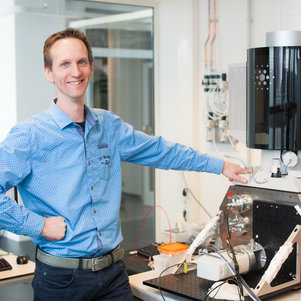Delmic: a modern continuation of Delft microscopy heritage
Microscopy is inextricably linked to Delft thanks to Antonie van Leeuwenhoek, who was the first to discover cells and microbiological structures with his self-built microscopes in the 17th century. A tradition microscope builder Delmic has been continuing since 2010 with innovative microscope technology. TU Delft Campus interviewed Jacob Hoogenboom of TU Delft who was involved in this innovative company early on and still works closely together with the company.
Hoogenboom, Associate Professor at the Faculty of Applied Sciences (TNW), explains that the Netherlands has a strong reputation in microscopy, but that until ten years ago this rarely translated into new business or commercial activities. “Thermo Fisher is, for example, a world leader in electron microscopy and traditionally a company with strong ties with Delft, located in Eindhoven. But such a large company often sees no commercial profit in innovative but small-scale products.” In 2010, the idea arose to set up Delmic and to serve niche audiences within microscopy. The first product is a combination of an electron microscope and a fluorescence microscope. Hoogenboom explains the difference: “an electron microscope has a much higher resolution than an ordinary light microscope. But a fluorescent light microscope is ideal for biological and medical research, because you are able to use fluorescent dyes that you can stick to specific proteins and then light up with a specific form of lighting. With the combination of the two you can look at tissues at particularly high resolution and at the same time make proteins or hormones visible. ”
Low chances of commercial success
The market for these types of microscopes is small and consists mainly of universities and teaching hospitals. TU Delft was not immediately convinced that there would be a viable market, Hoogenboom explains. “Because TU Delft was initially also sceptical, we founded Delmic ourselves. After taking over a first patent application, support from the NWO followed, and we started to expand the company steadily. “Hoogenboom says it was a different world back then compared to the entrepreneurial climate around TU Delft now: ” The Innovation & Impact Centre had just started then. The procedures surrounding IP and stimulating entrepreneurship were still in their early days. Exactly how a university can stimulate business activity can be a complex issue. As a university you do not want to get in the way, but you also do not want to give up all your “recipes” just like that. Now all that is better-managed. ”
Want to read more? The whole article can be read here.
Source: TU Delft Campus
